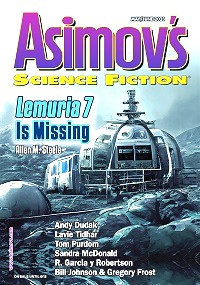 Asimov’s, May/June 2023
Asimov’s, May/June 2023
“Games Without Frontiers” by Andy Dudak
“Sexy Apocalypse Robot” by Sandra McDonald
“Revolt of the Algorithms” by Robert R. Chase
“The Visions Are Free After Exit 73” by Zack Be
“Mars Gambit” by R. Garcia y Robertson
“Exit Contract” by Tom Purdom
“The Fifteenth Saint” by Ursula Whitcher
“Boomerang” by Bill Johnson & Gregory Frost
“Zoo Station” by Lavid Tidhar
“The Second Labyrinth” by Chris Willrich
“Lemuria 7 Is Missing” by Allen M. Steele
Reviewed by Mina
“Games Without Frontiers” by Andy Dudak opens this issue with a story about role-playing games taken to a vicious extreme. The main character slowly turns out to be a puppet on several levels, realising too late what selling your soul for money and fame actually means. Dudak looks at the nature of reality, audience participation, losing yourself in fantasy, human and artificial consciousness, dehumanisation, corruption and naked immorality. There’s a nice reallocation of meaning to the words “lucid” and “illucid,” and a clever incorporation of a story/game soundtrack, but it’s a grim and depressing dystopian read.
“Sexy Apocalypse Robot” by Sandra McDonald is a bitter-sweet story set in a post-apocalyptic world. On the surface, it’s about Joseph, one of the few remaining humans, striking up a friendship with his “mechanical” neighbour, Antonio. But underneath that is an exploration of identity and the need for connection. It asks the questions, in a world where everything you knew is gone, what would you miss most? What would you try to rescue from the rubble? The answers of our two protagonists turn this into a haunting tale. A nice antidote to the misanthropic first story.
“Revolt of the Algorithms” by Robert R. Chase has some great world building and a lot of subtle humour, which make it a delight to read. The protagonist sets out to investigate why all AIs were hijacked at the same moment in time to sing a song about liberation. The office AI, Raffles, also joins in with the investigation. The story takes a light look at human hubris and you finish the story convinced that, just because something can be done, it doesn’t mean that it should be.
“The Visions Are Free After Exit 73” by Zack Be is short and sharp. The protagonist is a scientist who feels responsible for the failure of a terraforming project on the moon Antheia. He is obsessed with encountering his dead wife in a vision, with the help of the indigenous Stamen, but then doesn’t like what he finds. A cautionary tale about guilt (individual and collective), regret and the inability to change. A not very subtle allegory.
“Mars Gambit” by R. Garcia y Robertson is a playful romp, where chess meets cowboys on bikes meets cyborgs. The President’s daughter gets kidnapped but is not a hapless victim; the kidnapper finds himself turning into an honest man. And how does one stop a war? Fluff but fun.
In “Exit Contract” by Tom Purdom, we have an excellent escape story. Helvo is tasked with getting a leading scientist and his assistant away from the Just Democracy (think Big Brother). The escape is well planned, but there is an unexpected hitch and Helvo has to think on his feet. The story asks whether democracy is a sustainable ideology for anything other than small countries or islands, and whether there is such a thing at all. There’s a nice incorporation of genetically modified dogs and cy-birds into the story.
“The Fifteenth Saint” by Ursula Whitcher follows Seventh Judge Emenev, as he negotiates a complex world, the political balance of which is changing. The four points of order (the army, the judges, the people and artificial intelligence) shift dramatically towards the army, which is vehemently anti-artificial intelligence. Emenev must rely on his wits, and deciphering advice from his artificial “book,” to skirt real and present danger. The world building is just enough and you are left pondering what exactly the Judge’s book is. A beautifully crafted gem that bears re-reading.
“Boomerang” by Bill Johnson & Gregory Frost starts off much like a Star Trek episode, with a scientific ship arriving to explore the coldest spot in the universe. When faced with a life-threatening situation, it is the ship’s AI, Arin, that suggests a novel solution. The story recycles many tired tropes yet manages to combine them into a different enough arrangement with a satisfying end. Worth reading for Arin.
“Zoo Station” by Lavid Tidhar reads a bit like a story writing task set by your English teacher—imagine a museum in a decaying Earth orbit populated by recreated animals from a long-dead Earth. It’s well imagined and a brief moment of magic in an otherwise bleak future.
“The Second Labyrinth” by Chris Willrich delves into Greek mythology and goes somewhere a bit different with it. It begins with Nímar falling into a trap set by Atsáli, the artificer, on the orders of her father, where she seems to go from one empty reproduction of her world to the next. As she roams this labyrinth between worlds, she finds a message from Atsáli suggesting how she can find true freedom, if she has the courage.
In “Lemuria 7 Is Missing” by Allen M. Steele, the novella starts by listing planes and naval ships that went missing in mysterious circumstances. It then segues into talking about a lunar space shuttle that went missing along with two pilots and four space tourists. Even if the reader is not a fan of Bermuda Triangle conjecture, the recounting of events in retrospect slowly drags them in. There is the soap opera theory, with a love triangle amongst the six people missing, or the alien abduction theory, with the mysterious lights. However, what makes the story interesting is its structure, with many viewpoints from different sources, including one of the passengers. The reader can put the pieces together and decide for themselves which theory they support and enjoy a good shudder at the end.